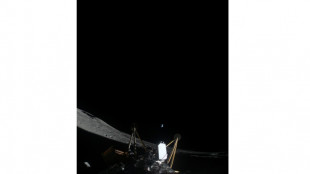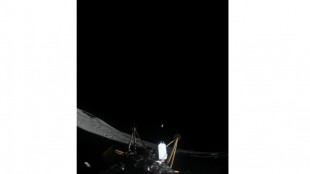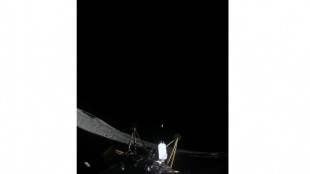
-
 Journalist quits broadcaster after comparing French actions in Algeria to Nazi massacre
Journalist quits broadcaster after comparing French actions in Algeria to Nazi massacre
-
Highlights from Paris Women's Fashion Week

-
 US ends waiver for Iraq to buy Iranian electricity
US ends waiver for Iraq to buy Iranian electricity
-
China-US trade war heats up with Beijing's tariffs to take effect

-
 Greenland's Inuits rediscover their national pride
Greenland's Inuits rediscover their national pride
-
Floods, mass power cuts as wild weather bashes eastern Australia

-
 Wild weather leaves mass blackouts in Australia
Wild weather leaves mass blackouts in Australia
-
China consumption slump deepens as February prices drop

-
 Phone bans sweep US schools despite skepticism
Phone bans sweep US schools despite skepticism
-
Some 200 detained after Istanbul Women's Day march: organisers

-
 'Grieving': US federal workers thrown into uncertain job market
'Grieving': US federal workers thrown into uncertain job market
-
Remains of murdered Indigenous woman found at Canada landfill

-
 Women will overthrow Iran's Islamic republic: Nobel laureate
Women will overthrow Iran's Islamic republic: Nobel laureate
-
Women step into the ring at west African wrestling tournament

-
 Trump's tariff rollback brings limited respite as new levies loom
Trump's tariff rollback brings limited respite as new levies loom
-
Hackman died of natural causes, a week after wife: medical examiner

-
 Oops, we tipped it again: Mission over for sideways US lander
Oops, we tipped it again: Mission over for sideways US lander
-
Cyclone Alfred downgraded to tropical low as it nears Australia

-
 Global stocks mixed as Trump shifts on tariffs weighs on sentiment
Global stocks mixed as Trump shifts on tariffs weighs on sentiment
-
Trump says dairy, lumber tariffs on Canada may come soon

-
 Trump cuts $400 mn from Columbia University over anti-Semitism claims
Trump cuts $400 mn from Columbia University over anti-Semitism claims
-
US Fed chair flags policy uncertainty but in no rush to adjust rates

-
 Adopted orphan brings couple 'paradise' in war-ravaged Gaza
Adopted orphan brings couple 'paradise' in war-ravaged Gaza
-
Oops, we tipped it again: Mission over for private US lander

-
 Greenland's mining bonanza still a distant promise
Greenland's mining bonanza still a distant promise
-
Pope 'stable' as marks three weeks in hospital with breathless audio message

-
 Shares slump on Trump tariffs tinkering, jobs
Shares slump on Trump tariffs tinkering, jobs
-
Mission over for private US lander after wonky landing

-
 Thousands stranded as massive WWII bomb blocks Paris train station
Thousands stranded as massive WWII bomb blocks Paris train station
-
UK court cuts longest jail terms on activists, rejects 10 appeals

-
 US hiring misses expectations in February as jobs market faces pressure
US hiring misses expectations in February as jobs market faces pressure
-
S.Sudan heatwave 'more likely' due to climate change: study

-
 US company says Moon mission over after landing sideways again
US company says Moon mission over after landing sideways again
-
Trump says farmers keen to quit 'terrible' S. Africa welcome in US

-
 US stock markets rise as investors track Trump tariffs, jobs
US stock markets rise as investors track Trump tariffs, jobs
-
US hiring misses expectations in February, jobs market sees pressure

-
 Disco, reggae on King Charles's 'eclectic' Apple playlist
Disco, reggae on King Charles's 'eclectic' Apple playlist
-
Australian casino firm strikes deal to avoid liquidity crunch

-
 Deposed king's grandson makes low-key return to Egypt
Deposed king's grandson makes low-key return to Egypt
-
Stock markets, bitcoin down as Trump policies roil markets

-
 Bangladesh student leader aims to finish what uprising began
Bangladesh student leader aims to finish what uprising began
-
Japan, Britain stress free trade in Tokyo talks

-
 Spain targets men's 'deafening silence' in gender violence battle
Spain targets men's 'deafening silence' in gender violence battle
-
Spain under pressure to abort nuclear energy phase-out

-
 Hungary femicide sparks outcry on gender violence
Hungary femicide sparks outcry on gender violence
-
Trial of Maradona's medics to start four years after star's death

-
 Women spearhead maternal health revolution in Bangladesh
Women spearhead maternal health revolution in Bangladesh
-
Apple step closer to seeing end of Indonesia iPhone sales ban

-
 China's exports start year slow as US trade war intensifies
China's exports start year slow as US trade war intensifies
-
Asian stocks, bitcoin down as trade uncertainty roils markets


Polish researchers invent anti-smog sound cannon
In a battle against Poland's constant smog, scientists are testing out a new "cannon" that uses soundwaves to push toxic particles higher into the atmosphere to allow residents to breathe.
Installed on top of a metal container, the experimental device consists of a large upside-down cone that makes a loud sound every six seconds.
The aim is to chase the smog from Kalwaria Zebrzydowska, which like many Polish towns and cities faces the problem every winter when residents fire up highly polluting heating systems.
When the sun goes down, a heavy smog descends on the town as chimneys belch out thick smoke.
Poland is one of the most polluted countries in Europe, breaching EU norms by hundreds of percentage points at the worst times of year.
By creating soundwaves, researchers say that the "cannon" helps reduce the concentration of harmful PM2.5 and PM10 particles in the town's air.
"We are using a vertical shockwave that is created by the combustion of acetylene and air," said Dominik Grybos from the Academy of Mining and Metallurgy in Krakow, one of the inventors.
"The wave projects the polluted air higher," he told AFP.
The toxic particles are sent up several hundred metres (yards) higher, making them harmless for residents.
"We have found that if we use the cannon for between half an hour and an hour, the pollution is reduced by 15-30 percent within a perimeter of two-three kilometres (1.2-1.9 miles) from the cannon," Grybos said, adding that the effects last for "between one and three hours".
Researchers are trying to work out the required frequency of the blasts, as well as the duration and the time needed for the entire procedure.
The price is estimated at 1,000-1,500 zloty ($250-$375) for one hour of use.
Grybos said he hopes the invention could find a commercial use, particularly in Poland.
Residents of Kalwaria Zebrzydowska are broadly in favour of the idea despite the sound.
"The smog is very heavy here. We can't air our flats because it stinks so much. So, if it can help, let them do the tests," said Jolanta Walkowicz, a 43-year-old accountant.
"We can barely hear the sound -- it's like fireworks going off," she added.
Y.Ibrahim--CPN
